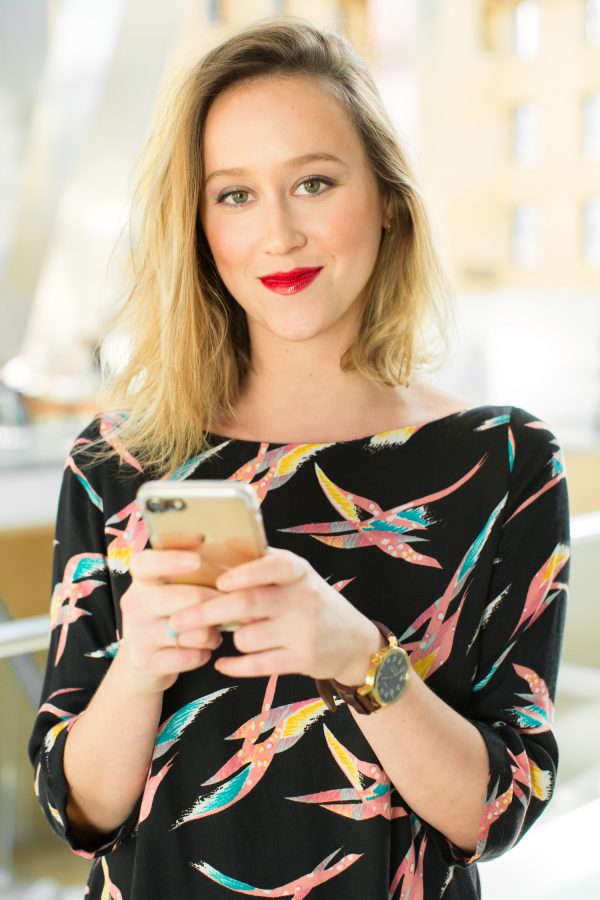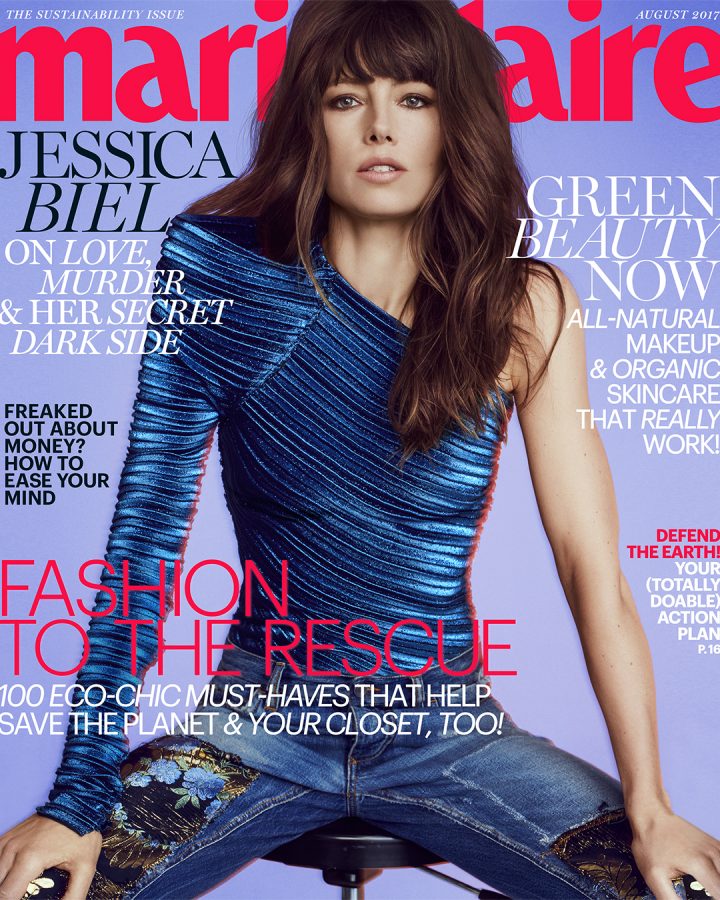
I grew up in Providence, Rhode Island, and then studied women, gender, and sexuality at Washington University in St. Louis. My first job out of college was at People magazine as an administrative assistant. I eventually joined the social media team, where I helped launch the brand’s channel on Snapchat Discover. Now I handle Social Media & Video Strategy at Marie Claire.
Name: Rosa Heyman
Age: 26
Location: New York City
Current title | Company: Senior Editor, social media & video strategy at Marie Claire, Hearst
Education: Bachelor’s degree in women, gender, and sexuality studies from Washington University in St. Louis
Website / social media pages: Instagram: @Rosaheyman Twitter:@Rosa_Heyman
Can you give a brief outline of your background, the first job you landed and how you got it?
My first job out of college was at PEOPLE.com, as an administrative assistant to the editor in chief and the VP. I spent the summer after graduation crashing at a friend’s place and setting up every informational interview that I possibly could. I was freelance writing on the side, earning virtually no money, and arranging lots of networking coffee dates—hoping that the kind person would take pity on me and foot the bill. My informational interview with a person in HR at Time Inc. led to a formal interview for the administrative assistant position, and the rest is history.
Did interning play a major role in securing your previous and current roles?
The skills that I developed during my undergrad internships and the network I built definitely helped me get hired at PEOPLE.com when I was fresh out of school. My first media internship—at BlackBook magazine in New York City—helped me secure my internship at RedbookMag.com the following summer. I cannot stress this enough: Contacts are soooo important in this industry. You never know who knows who, or who has worked with who, which is why it’s super important to work really hard, make a good impression, and never burn a bridge.
How did you manage to transition from studying Women & Gender studies ‘WGSS’ into becoming a Social Media Editor?
WashU, my university, didn’t have a proper journalism program, so I was always of the mindset that I would study a subject that interested me and pursue journalism opportunities elsewhere. I actually think my WGSS background helps me a lot in my current role at Marie Claire. We publish stories about a ton of diverse and complicated subjects—all of which pertain to womanhood in some way. I’m equipped to write and think critically about those subjects because of my studies.
Senior Editor for social media & video strategy for US Marie Claire, I’m sure it sometimes feels like a dream! how did that happen?
My high school self would definitely be proud of me now! My goal has always been to work at a women’s interest publication, so when I was ready to move on from People, I tailored my search and sought out openings specifically at women’s lifestyle brands.

At PEOPLE you worked on a team with several other social media editors, how did it feel to transition into a one-man team at Marie Claire?
It was both daunting and exciting. I’m ambitious and a bit of a workaholic (I inherited that from my dad), so part of me loves having this much responsibility. I’ve learned a ton from being a ‘one-man team’ and I feel a huge amount of ownership for my work, which is very gratifying. There are certainly days when I wish I had someone dedicated to social media with whom to brainstorm or share frustrations. But the rest of the MarieClaire.com team is very supportive and willing to talk social with me.
Was this a career you had always planned out for yourself?
That’s a tough question to answer. I always wanted to work in magazines, and I became interested in digital media while I was in college. However, social media was only just becoming a viable career path when I moved to New York. So on the one hand, I’m right where I dreamed I would be—at a women’s lifestyle brand—but on the other hand, I never could have imagined what my current job entails.
Your job requires you to be constantly up to date with news even when you are out of the office, how do you set boundaries in your personal life?
It’s tricky and I’m not always good at it. When I’m with friends or my family, I really try to stay off my phone as much as possible. Some days, I am very maxed out on the internet and social media, so it’s a bit easier for me to just keep my phone in my bag and not even be tempted to check it. Other times, I’ll try to be upfront and realistic, so I’ll say to my boyfriend, “Okay, I’m just going to take ten minutes to check my email and take care of this situation.”
Networking is a must in your career, what are your 3 major networking tips?
• Treat everyone like they could one day be in a position to hire you. Truly. You don’t know where your intern is going to end up! Always be kind.
• Stay in touch. There’s nothing wrong with sending a brief, polite email updating your old boss about your current job, or even just saying a quick hello. In fact, it’s good. You should do it.
• When someone has gone out of their way to introduce you to a contact of theirs, don’t drop the ball. It reflects poorly on both of you. Send a thank-you note. Don’t waste anyone’s time.
What’s the best way to get into this career path?
Intern at a digital media company and start freelancing so you can gather some clips. Try to network with people who are already established in the industry as much as possible. Pay attention to updates in the Facebook algorithm and other industry trends so that you’re aware of what’s happening. The digital landscape changes rapidly, so if you’re able to educate yourself and show a passion for the industry before you’re even officially employed, you’ll have that much of a leg up.
What are the most important elements of a social media strategy?
The ability to be truly responsive to your audience and the willingness to adapt your strategy often. Some strategies that worked a month ago no longer work today. I’m constantly monitoring what kinds of posts are successful and why. Social media strategy is the perfect union of psychology and analytics—I use data to understand our reader’s behavior in order to ultimately serve her up the content she actually wants to read and watch.
What is your definition of success?
To me, success is devising a strategic plan and then executing on that plan. That’s not to say I remain rigid; in this fast-paced environment, issues constantly arise and I have to adapt. But I think true success comes when you’re able to roll with the punches and still get what you need to get done.
If you could go back and make any changes in your career, what would they be?
I really don’t regret any of my past career decisions, though I wish I could go back in time and make myself feel less nervous in interviews. When I was more junior in my career, I wasn’t as confident in the value that I brought to the table. I think my lack of confidence undermined my authority and obscured my work ethic and my accomplishments.
Can you share a recent success story that makes you a proud working lady?
I oversee the video editor on my team and she recently told me that we have one of the best “managerial” relationships she’s ever had. I was so happy to hear that. I don’t have much managing experience, and so it’s been a role that I’ve actively sought out. Great managers helped me get to where I am today, so I was thrilled to hear that I’m even just baby steps closer to emulating them.
What 3 tips would you share on becoming a successful social media editor?
• Figure out what you need to do to stay organized, and then do it. There are a lot of details—both big and small—to juggle in this job.
• Be adaptable. This job isn’t just about pushing content out on Facebook or Instagram—it’s about recognizing what your audience wants and figuring out how best to deliver it to them. For instance, video is now a huge part of our strategy, but it was a small mention in the job description when I was hired here two years ago.
• Unplug. I’m flying a mile a minute every day at work. If I didn’t give myself the space to recharge, or—gasp—read something that isn’t on a screen, I would burn out. And fast. Knowing when to step away from work is an actual skill, and in the long run, it’ll keep your mind fresh and creative.
What’s the most important advice you have received that you would like to share with other ladies?
My first boss told me to think about the job that I want to have two jobs from now. In other words, when you’re considering a new position or taking on a new responsibility, consider how it positions you for future jobs down the line. Even if you don’t know exactly where you want to end up, you’re being thoughtful about the skills you’re gaining along the way.
What would you tell your 20-year-old self?
Get more sleep.
What is the future for you in your career?
The great thing about social media is that it sets you up to go in many different directions. There’s the audience development/analytics route, and there’s the path of continuing to direct content strategy on a digital editorial team. I’m still figuring out my next move.
Follow @MarieClaire on Twitter and Facebook, and @MarieClaireMag on Instagram!

Wow! Rosa is indeed a role model for other young woman. Smart, good sense of humor, interested in things that matter. Are all women her age this mature? I wish that she were my granddaughter.
One concern: Why refer to grown women as “the ladies.” That’s a throwback to the 19th century.
I teach Women’s Studies and I wish that all my students were like her.
Karel Rose